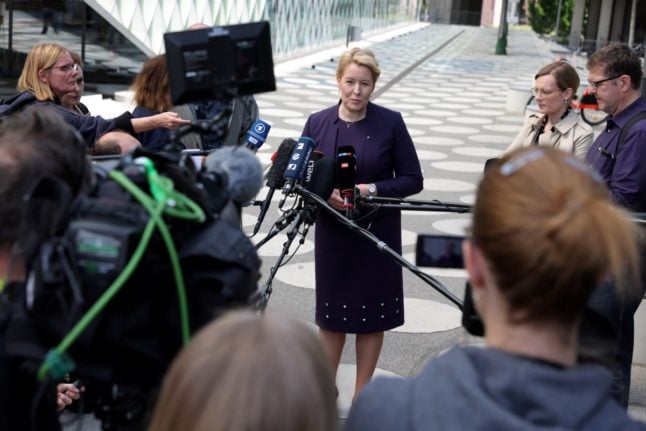The German government condemned the “growing despicable attacks”, stressing that the “climate of intimidation, of violence” was something that could not be accepted.
Chancellor Olaf Scholz blasted the attacks against politicians as “outrageous and cowardly”, stressing that violence did not belong in a democratic debate.
Franziska Giffey was at a library on Tuesday afternoon when the suspect came up from behind her to slug her in the head and neck with a bag containing hard objects, police said.
Giffey, who is now Berlin state’s economy minister and a member of Chancellor Olaf Scholz’s Social Democratic Party (SPD), was treated in hospital for light injuries.
The detained suspect was previously known to investigators over “state security and hate crimes”, said police, adding that they were investigating the motive of the attack.
Prosecutors were also considering if the man should be sent to psychiatric care because of indications that he might be mentally ill.
Giffey said she was “feeling well after the initial scare”. But she was “concerned and shaken about a growing ‘free wild culture’ in which people who are engaging politically in our country are increasingly exposed to attacks that are supposedly justified and acceptable.
“We live in a free and democratic country, in which everyone can be free to express his or her opinions,” she wrote on X, formerly Twitter.
“But there is a clear line — and that is violence against people,” she added.
Berlin’s current mayor Kai Wegner said anyone who attacked politicians was “attacking our democracy.
“We will not tolerate this,” he added, vowing to examine “tougher sentences for attacks against politicians”.
Nazi salutes
A European member of parliament, also from the SPD, had to be hospitalised last week after four people attacked him as he put up EU election posters in the eastern city of Dresden.
Matthias Ecke, 41, needed an operation for serious injuries suffered in the attack, which Scholz denounced as a threat to democracy. Four suspects, aged between 17 and 18, are being investigated over the incident.
READ ALSO: Teenager turns self in after attack on German politician
All four are believed to have links to the far-right group known as “Elblandrevolte”, according to German media.
Dresden has been a hotspot for assaults against politicians, with another case reported on Tuesday.

A politician, identified by police only as a 47-year-old from the Green party, was threatened and spat on. She was putting up campaign posters for the European elections when a man came up, pushed her to the side and tore down two posters.
READ ALSO: Germany unveils new plan to fight far-right extremism
He insulted and threatened the politician, while a woman joined in and spat on the victim, police said. Officers arrested both suspects, police added, identifying them as a 34-year-old German man and a 24-year-old woman.
Both were in a group standing at the area and who had begun making the banned Hitler salute when the politician began putting up the posters.
According to provisional police figures, 2,790 crimes were committed against politicians in Germany in 2023, up from 1,806 the previous year. Nevertheless, that was down from the 2,840 recorded in 2021, when the last general elections were held.
By Hui Min Neo



 Please whitelist us to continue reading.
Please whitelist us to continue reading.
Member comments